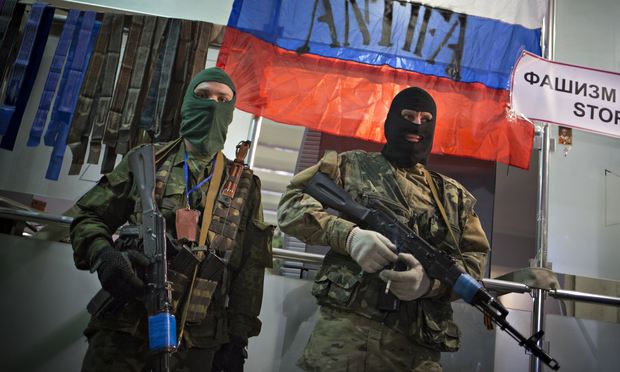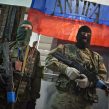
Russian Hybrid War, Euro-Hybrid Democracy in Ukraine’s East (Part Two)
Publication: Eurasia Daily Monitor Volume: 12 Issue: 184
By:

*To read Part One, please click here.
Russian President Vladimir Putin, German Chancellor Angela Merkel and French President François Hollande have prevailed on Ukrainian President Petro Poroshenko to accommodate pseudo-elections in the Russian-controlled territory into a special Ukrainian law. Poroshenko himself, and the Ukrainian body politic at large, had even recently characterized the elections planned in the Donetsk and Luhansk “people’s republics” (DPR, LPR) as “fake elections.” Nevertheless, the pressure on Poroshenko seemed irresistible at the “Normandy” forum’s October 2 summit in Paris (see Part One in EDM, October 9).
“Fake elections” in that territory would not only lack real choices. They also lack a basis in Ukraine’s constitution and legislation. But it is possible to create the appearance of such a basis in the DPR-LPR, depending on a Western compromise with Russia that would, in turn, pressure Kyiv to accept the DPR-LPR’s pseudo-elections and their outcome. That process has started, as mandated by the Paris summit of the Minsk Contact Group. There, negotiations are under way about a special law of Ukraine on elections in Donetsk-Luhansk.
Holding valid elections in the DPR-LPR under Russian military and proxy control, however, is inconceivable a priori. Tacitly acknowledging this reality, Berlin and Paris seem ready to accommodate Moscow by lowering the standards through that “special law,” other than Ukraine’s electoral law. The elections would help the DPR-LPR authorities look, if not exactly democratic, at least as if holding legitimate electoral mandates. This would then qualify the DPR-LPR to hold negotiations with Kyiv as co-equal parties.
Lowering the electoral standards specially for Donetsk-Luhansk seems to be the function of the “Morel Plan,” attributed to Pierre Morel, formerly ambassador of France in Moscow and long-time expert on “frozen” conflicts. This document forms the basis for that special law on Donetsk-Luhansk elections. It is being proposed jointly by Moscow, Berlin and Paris as a basis for negotiations between Kyiv and Donetsk-Luhansk. President Poroshenko attempted to side-step the proposal, characterizing it as “Morel’s personal opinion” (Ukrinform, September 19, 21). But, at the Normandy forum’s October 2 summit in Paris (see above), Poroshenko was pressured into authorizing negotiations between Kyiv and Donetsk-Luhansk on the basis of the “Morel plan” (Elysee.fr, Kanzlerin.de, October 3; Liga.net, October 3).
According to German and French diplomats, cited by the Deutsche Welle public broadcaster, and corroborated by Ukrainian officials, the impulse for the Morel plan came from the bilateral Washington-Moscow channel operated by Assistant Secretary of State Victoria Nuland and Deputy Foreign Affairs Minister Grigory Karasin, and it was then suggested to the Normandy forum participants. The basic idea is to conduct those local elections under Ukraine’s aegis de jure, but under modalities allowing the DPR-LPR to organize those elections largely by themselves in practice (Deutsche Welle, September 27, October 2; Liga.net, October 3).
That would amount to enforcing Russia’s interpretation of the letter of the Minsk armistice on Ukraine as regards “elections.” Under the armistice, these elections are to be conducted under Ukrainian law, but under modalities to be agreed between Kyiv and Donetsk-Luhansk—i.e., ultimately under something other than Ukrainian law. This process “hybridizes” Ukrainian elections and sovereignty in this territory.
As disclosed by Ukraine’s influential Dzerkalo Tyzhnya weekly (September 19–25 issue), the Morel document—“Elements of a temporary law on local elections in certain areas of the Donetsk and Luhansk regions”—represents, in effect, the draft of a special law on local elections in the DPR-LPR. Those elections form the political mechanism for the DPR-LPR to acquire the proposed special status; while conceding a special status (in Moscow’s, Berlin’s, Paris’s, and even the Obama administration’s reading) is Ukraine’s core “obligation” under the Minsk armistice.
If adopted and enacted by Ukraine—thus, enshrined in law as proposed—the “Morel plan” would cancel (by overriding) Ukraine’s existing legal basis for the conduct of local elections in that territory. That basis is comprised of Ukraine’s electoral legislation (applicable to the whole country) and the election-related provisions of Ukraine’s law on “special procedures on local administration in certain areas of the Donetsk and Luhansk provinces” (popularly known as the law on special status, not yet in force).
The “Morel plan” would remove the DPR-LPR from the area of applicability of Ukraine’s electoral legislation. Thus, the DPR-LPR’s unlawful local authorities would be able to create electoral commissions and have their say in forming electoral districts, assessing the eligibility of Ukrainian political parties and their candidates to run, as well as carrying out mass media accreditation and other election-related decisions. After these elections, Moscow and the DPR-LPR could capitalize on this precedent-setting case in order to remove the DPR-LPR from Ukraine’s legal field in many other respects (their reading of the special status opens ample possibilities for this).
This proposal also excludes the preconditions and safeguards for correct elections, as stipulated in Ukraine’s law on a special status to Donetsk-Luhansk (see above). Those preconditions and safeguards include: the withdrawal of Russian forces, the disbandment of the “DPR-LPR’s” unlawful military formations, and the restoration of Ukrainian sovereignty in this territory, including the control of the Ukrainian side of the border with Russia. On the other hand, Moscow, Berlin, Paris and Donetsk-Luhansk all regard the mere ceasefire as a sufficient condition for staging these “elections.”
Negotiations on the “Morel Plan”–based special law are now underway in the Minsk Contact Group (Interfax, October 6). According to President Poroshenko, in his October 12 address to the nation, “elections in the occupied territories may only take place in accordance with Ukrainian laws” (Ukrinform, October 12, 13).
That formulation used to mean the guarantees of Ukraine’s constitution as well as Ukraine’s law of September 2014, supplemented in March 2015 and confirmed in July 2015, regarding democratic pre-conditions and safeguards of elections in the occupied territory. Poroshenko did not reference the negotiations on a “special law” in his address, and referenced Ukraine’s own legislation (see above) indirectly.
The “Normandy” powers take the position that the “special law” under negotiation between Kyiv and Donetsk-Luhansk, mandated as it is by the Minsk armistice, would override Ukraine’s own legislation as regards the DPR-LPR elections. And this, in turn, marks a first move to replace Kyiv’s title to sovereignty in Donetsk-Luhansk with a negotiated relationship between Kyiv and Donetsk-Luhansk. Staging and validating elections in the occupied territory would further strengthen Donetsk-Luhansk’s and Moscow’s negotiating hand versus Kyiv.




